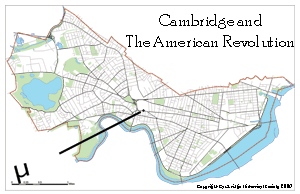The Courthouse
Although John Adams was infamous for an extremism that predated most other revolutionary motion, his response to the 1765 Stamp Act offered a striking piece of counsel that foreshadowed the increasing belligerence of the colonial resistance. In a 1765 Boston Gazette article addressed to frustrated colonists, Adams declared, “The true source of our sufferings is our timidity.” As punishment for the Boston Tea Party, the royal leadership passed a series of laws that the colonists dubbed “The Intolerable Acts.” The Intolerable Acts were the first set of parliamentary regulations enacted primarily to rebuke the rebellious provincials. For example, the Port of Boston was shut down, crippling the city’s economy. The colonial assemblies were dissolved, and the colonial government was brought under direct British authority. A council, call the Mandamus Council, replaced locally elected officials. Although several Tory Cantabridgians were installed in seats of power, the town of Cambridge refused to recognize their jurisdiction, declaring that their locally-elected officials were sovereign, “…you [local representatives] may seem most conducive to the real interests of this town and province, and most proper to deliver ourselves and all America from the iron jaws of slavery.”
As the 1770s progressed, colonists lived with the looming threat of a violent outbreak. Towns and villages raised militias. Regional powderhouses that stored both the gunpowder for towns and for the royal provincial government came under scrutiny. With the provincials’ blatant displays of military practice drills and public seizure of powder, the British authorities grew uneasy. The build-up of colonial armories only exacerbated the British-colonial tensions that had been mounting for the past ten years.
On September 1, 1774, Royal Governor and Commander In Chief of the Royal Forces sent 300 soldiers on a secret expedition to the Charlestown powderhouse (still standing in modern-day Somerville) to legally confiscate the colony’s stores of powder. Fallacious rumors of an armed British invasion spread throughout the Colony and down the East Coast. Thousands gathered on Cambridge Common to protest this seizure of gunpowder and the Intolerable Acts.
The following day, armed only with sticks, a crowd of 4,000 colonists marched down Brattle Street to harass William Brattle for his role in what came to be known as the Powder Alarm of 1774. They called for the resignations of Lieutenant Governor Thomas Oliver and Judges Samuel Danforth and Joseph Lee from the Mandamus Council. In a dramatic scene on the courthouse steps, both judges conceded to the crowd’s order and resigned. Judge Lee declared, “As a great numbers of the inhabitants of the County are come into this town since my satisfying those who were met, not only declaration but by reading to them what I wrote to the Governor at my resignation, and being desirous to give the whole County and Province full satisfaction in this matter, I hereby declare my resignation of a seat in the new constituted Council, and my determination to give no further attendance.”
 |
Back to Interactive Map |
